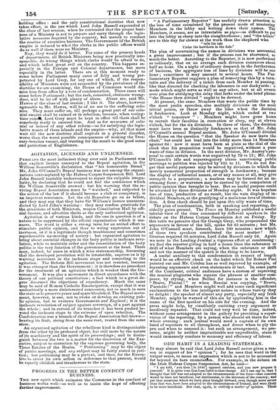AGITATION, LICENSED AND UNLICENSED.
PERHAPS the most indiscreet thing ever said in Parliament was that explicit licence conveyed to the Repeal agitation, in Sir William Somerville's declaration that "his honourable friend" Mr. John O'Connell's Repeal business was not among the organi- zations contemplated by the Habeas Corpus Suspension Bill. Lord John Russell laudably endeavoured to repair the culpable irregu- larity, by declaring that he could not feel the confidence which Sir William Somerville avowed : but his warning that the re- viving Repeal Association must be "watched," and subjected to the action of the law if it should become a club or conspiracy, is an impotent resistance. Let the old Repealers go on as before, and they may say that they have Sir William's licence uncontra- dicted by Lord John's warning : they may confess gratitude for the attentions of both Ministers, reopen Conciliation Hall by offi- cial licence, and advertize theirs as the only authorized agitation. Agitation is of various kinds, and the one in question is of a nature to be suppressed by the official organization which it me- naces. The word is either a strong term for an united effort to stimulate public opinion, and thus to wring expression out of inertness, or it is a legitimate though troublesome and sometimes reprehensible up-moving of society : but organized agitation to bring about essential changes in the body politic is inchoate revo- lution, while to maintain order and the consolidation of the body politic is the very function of the government at the head. There may, indeed, be cases in which a wise statesmanship, foreseeing that the developed revolution will be irresistible, supersedes it by waiving resistance in the inchoate stage and conceding to the agitation. The Reform Bill movement was not resisted, because it was stronger than the Government : it is therefore no precedent for the treatment of an agitation which is weaker than the Go- vernment. It was also a movement in direct accordance with the theory of our political constitution ; a fact which to a great de- gree disarmed the objections of expediency. Much the same may be said of Roman Catholic Emancipation, except that it was undoubtedly a more disinterested concession, not so much to save the state as to preserve peace and spare bloodshed. The Repeal move- ment, however, is one, not to evoke or develop an existing pub- lic opinion, but to overawe Government and England; it is the inchoate revolution of subject against sovereign, of a part against the whole ; and in certain of its branches it has been pushed be- yond the inchoate stage to the extreme of open rebellion. The Confederation was a branch of the Repeal Association full-blown— bearing its fruit, rising from the same root, reared from the same stem.
An organized agitation of the rebellious kind is distinguishable from the other by its professed object, but still more by the nature of its machinery and the spirit of its proceedings ; and to distin- guish between the two is a matter for the discretion of the Exe- cutive, subject to correction by the supreme governing body, the Three Estates of the Realm. " Petitioning may be the object of public meetings, and any subject may be fairly stated in peti- tion; but petitioning may be a pretext, and then, for the Execu- tive to arrest its own action in deference to that pretext, would be equally childish and treacherous to the state.






















 Previous page
Previous page